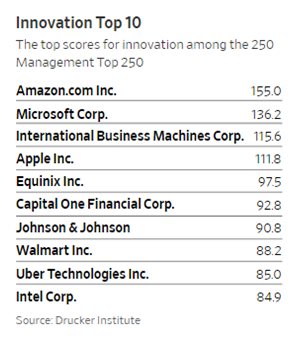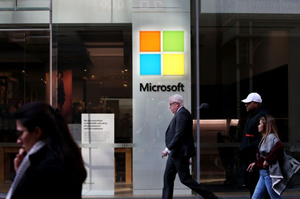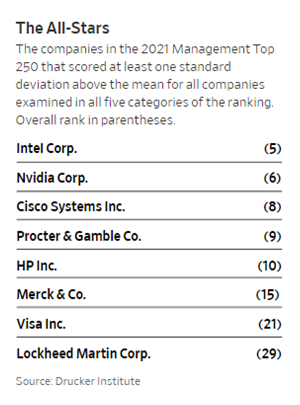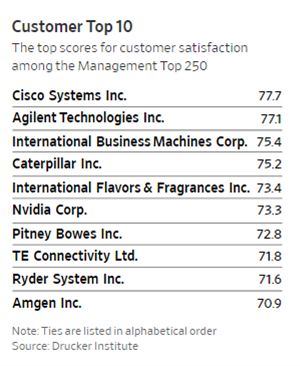
|
JOURNAL REPORTS: LEADERSHIP
The
Best-Managed Companies of 2021—and How They Made It to the Top
Microsoft is on top once again in the
Drucker Institute’s annual Management Top 250 ranking. Among the
biggest losers this year: AT&T and ExxonMobil
|
By Patrick
Thomas
Updated Dec. 11, 2021 9:29 am ET
Technology giants reign
as America’s best-run companies.
The companies earning
the highest marks in this year’s Management
Top 250 ranking have capitalized on what is now a
nearly two-year stretch of pandemic-driven economic upheaval that
has changed the way people work and shop.
At the very top, Microsoft Corp.
held on to its No. 1 spot in the annual ranking, which uses the
principles of the late management guru Peter Drucker to identify the most
effectively managed companies. Microsoft ranks no lower than sixth in four of
the five main components of the overall ranking compiled by researchers at
Claremont Graduate University’s Drucker Institute: employee engagement and
development, innovation, social responsibility and financial strength. It is No.
261 in customer satisfaction among the 846 companies examined for this year’s
ranking.
Amazon.com Inc.
ranks second overall this year, followed in order by
Apple Inc.
and International
Business Machines Corp.,
with
Intel
Corp. rounding out the all-tech top five.
“They were well managed and they
made the most of a pretty chaotic environment,” says Zachary First, Drucker’s
executive director, of the top-ranked companies. “Last year was a good time for
companies that know how to innovate and know the value of innovation.”
The analysis captures data through
the end of June, reflecting the impact of the pandemic as well as the first few
months of the economic recovery.
Microsoft’s overall score has
increased more than any other company’s since Drucker researchers began ranking
the best-managed companies in 2017, The increase in its innovation score over
that period also is the biggest of any company. Chief Executive Satya Nadella
has pushed the company to develop its cloud-computing business since taking over
in 2014, a sector that has thrived the past few years.
“I think what’s impressive about
Microsoft is what Satya Nadella has done under his watch,” says Willy Shih, a
professor of management at Harvard Business School. “His willingness to let go
of the old and move to the new and move to cloud-first, that was a key decision.
A lot of organizations have trouble letting go.”
“I think we were in the right place
at the right time,” says Chris Capossela, Microsoft’s chief marketing officer,
explaining the company’s strength during the pandemic. “Our reinvention to the
cloud has been a huge part of our success.”
In
November, Mr. Nadella reaped some of the benefit of the Microsoft’s success, selling
about half of his shares in the company. In a filing with the U.S.
Securities and Exchange Commission, the Redmond, Wash.-based software company
reported Mr. Nadella sold 838,584 shares over two days, out of holdings of close
to 1.7 million shares. The transaction yielded more than $285 million for Mr.
Nadella. The company said he sold the stock for personal financial planning and
diversification reasons.
Not all technology companies thrived
in 2021. Some early-pandemic darlings cooled off in this year’s rankings. Zoom
Video Communications Inc.,
ranked in the top 200 a year ago, fell out of the Top 250 after declining
customer and employee satisfaction scores. After nearly two years of working
virtually during the pandemic for many people, there are clear
signs of burnout in an era of nonstop video calls, though companies
have said they expect flexible work arrangements to endure. Zoom didn’t respond
to requests for comment for this article.
Google parent Alphabet Inc.
fell eight spots from a year ago to No. 13 this year, in part because of a
17-point decline in its employee engagement and development score, as well as
smaller declines in innovation and social responsibility. A group of Google
employees formed a union during the pandemic, the Alphabet Workers Union, to
organize workers and give them the ability to speak out about the company. This
October, In an interview at The Wall Street Journal’s Tech Live conference,
Alphabet CEO Sundar Pichai said employee
activism pushes companies to be more accountable. Google didn’t
comment for this article.
Warning signs
While every company has flaws, the
Management Top 250 ranking aims to point out firms that are particularly good at
balancing a wide range of what are often competing management priorities. For
instance, the 34 metrics used to determine the rankings include employee pay
compared with industry averages, patent applications and three-year average
total shareholder return.
The researchers also use a “red
flag” system to highlight companies with particularly weak scores in one or more
dimension of Drucker’s scorecard. The red flags serve as a warning that a
company—even one that scores highly in every other aspect of the ranking—needs
to address an area of weakness before it has a broader effect on its business.
This year, 56 companies in the
Management Top 250 in a wide range of industries were flagged, including Allstate Corp.
and Walmart Inc.
for low scores in employee engagement and development, Philip
Morris International Inc.
and Wells
Fargo & Co. for customer satisfaction, Nasdaq Inc.
for innovation, Tesla Inc.
for social responsibility and Hilton
Worldwide Holdings Inc.
and Delta
Air Lines Inc.
for financial strength.
Facebook’s parent company, Meta
Platforms Inc.,
earned a red flag this year for its weak customer-satisfaction score. Meta fell
19 spots in the overall ranking this year, to No. 31 from No. 12 last year, with
its disproportionately low customer-satisfaction score coming amid continuing
criticism of Facebook’s alleged harm to some users and the company’s handling of
misinformation, among
other issues. The Drucker researchers say Meta’s overall statistical
profile bears a resemblance to those of big tobacco firms: high marks for
financial strength but low scores for customer satisfaction.
A spokesman for Meta declined to
comment.
Stalwarts and
stumbles
Another prominent name, Procter
& Gamble, the maker of Tide, Bounty and many other consumer products,
remained in the top 10 thanks to high scores across the ranking’s five
dimensions of performance. The company has benefited from consumer shifts
spurred by the pandemic, but it also began making changes
to its complex management structure that had sometimes put brand
managers and country managers at odds.
P&G is one of eight companies this
year with particularly high scores across all five dimensions of the ranking.
The others are Intel, Nvidia Corp.,
Cisco Systems
Inc.,
HP
Inc., Merck
& Co., Visa Inc.,
and Lockheed
Martin Corp.
AT&T Inc.
fared worse, dropping 106 spots, to No. 166 this year from No. 60 last
year—despite a higher customer-satisfaction score this year—due to declines in
innovation, social responsibility, employee engagement and development, and
especially financial performance. Earlier this year, AT&T decided to unwind its
big bet on entertainment by agreeing
to combine WarnerMedia with Discovery Inc. in a new publicly traded
company, completing AT&T’s retreat from the media business.
“The data doesn’t capture employee
or customer response to the public announcement of the deal, but it does capture
employee and customer response to the realities of a company struggling with
what to own and what to divest,” says Drucker’s Mr. First.
An AT&T spokeswoman pointed to
company CEO John Stankey’s comments at the time of the merger announcement that
it will help AT&T be one of the best-capitalized broadband companies, focused on
investing in 5G.
It was also a down year for ExxonMobil Corp.,
which fell off the Top 250 list entirely this year—from No. 177 last year—after
its financial-strength rating declined. In 2021, an activist investor
successfully campaigned to win seats on the board of the oil giant. The remade
board of directors is debating whether to more forward with several major oil
and gas projects as the company reconsiders its investment strategy in a
fast-changing energy landscape.
An Exxon spokesman says the rankings
capture one of the most challenging years in company history, and that in 2021
it made progress improving earnings and operating performance in a recovering
market. In October, Exxon reported quarterly
earnings of $6.8 billion, its best quarterly performance since 2017.
The industry is reaping the rewards of resurgent commodity prices as the economy
emerges from pandemic-driven stagnation.
Exxon has fallen the farthest since
the first Drucker ranking. Since 2017 the company has declined in all dimensions
of the ranking except its social-responsibility score, which is based on various
metrics that reflect environmental,
social and corporate-governance issues, the researchers say.
Drucker’s social-responsibility
metric relies on various ESG rating services that reward companies for having
policies in place for emission reduction or for not using forced labor in their
supply chain, among other things. But it doesn’t measure if a company follows
through on its pledges. For example, companies may earn higher marks for
statements made in response to the murder of George Floyd last year, but whether
or not they followed through on any diversity and inclusion efforts would be
better represented in the ranking’s employee-satisfaction score, the researchers
say.
“This is an area in which you have
to work with the data you have,” says Mr. First. “Companies can do fairly well
on these systems simply by disclosing and reporting certain things.”
Mr. Thomas is a Wall Street Journal reporter in New York. He can
be reached at patrick.thomas@wsj.com.



